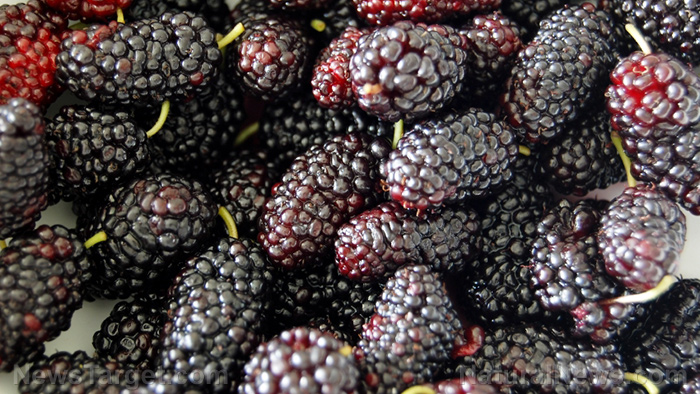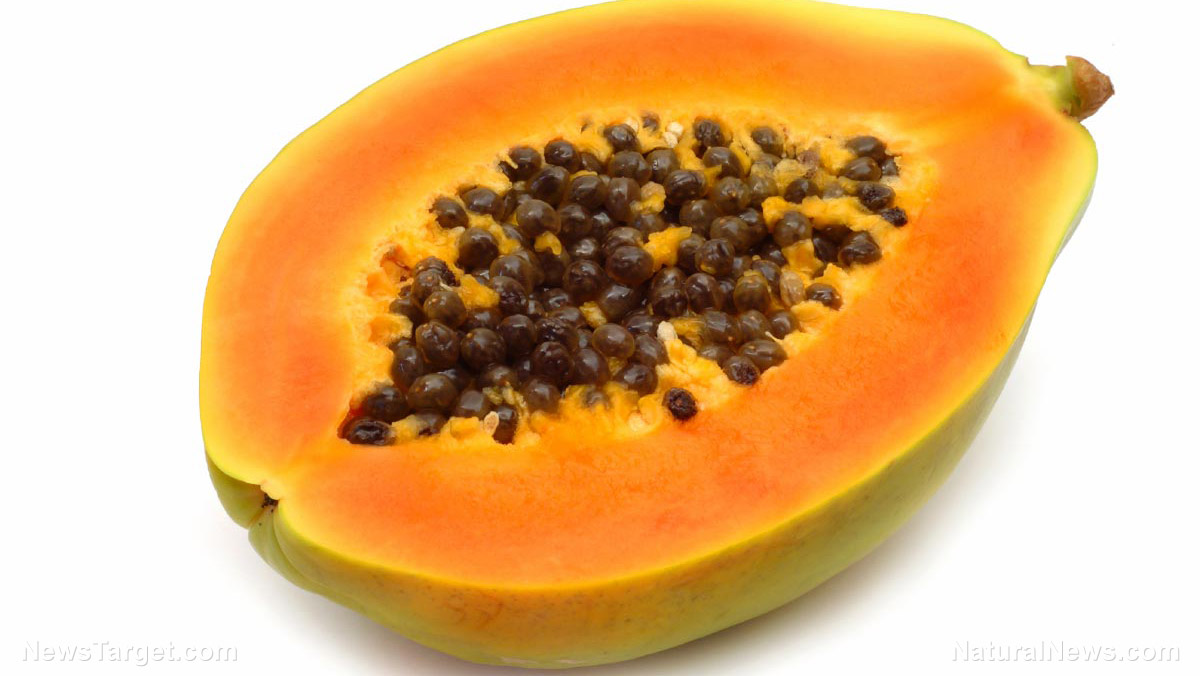Mulberries – sources, health benefits, nutrients, uses and constituents at NaturalPedia.com
06/27/2017 / By Frances Bloomfield

Mulberries are the small fruits of mulberry (Morus) trees, a genus of flowering plants which counts well over a dozen species of trees. Of those trees, there are three that are the most widely recognized: white mulberries (Morus alba), American or red mulberries (Morus rubra), and black mulberries (Morus nigra). Mulberries have steadily grown in popularity all over the world due to their sweet, succulent flavors and numerous health benefits. Apart from the fruits, the leaves serve as a food source as well; silkworms are dependent on the leaves of mulberry trees.

List of known nutrients
Mulberries are rich in phytonutrient compounds, particularly anthocyanins and resveratrol. Both of these substances have antioxidant effects that decrease the body’s susceptibility to inflammation, bacterial infections, and many other debilitating health conditions. Resveratrol is an especially important nutrient as it makes the blood vessels less prone to constriction and blood clot formations.
Their list of vitamins, minerals, and antioxidants is long and diverse, as it includes:
- Biotin
- Chlorogenic acid
- Cyanidin
- Fiber
- Iron
- Magnesium
- Manganese
- Myricetin
- Potassium
- Rutin
- Vitamin B1 (Thiamine)
- Vitamin B2 (Riboflavin)
- Vitamin B3 (Niacin)
- Vitamin B6 (Pyridoxine)
- Vitamin B9 (Folate)
- Vitamin C
- Vitamin E
- Vitamin K1 (Phylloquinone)
- Zeaxanthin
Medicinal uses for mulberries
Mulberries are an excellent source of heart-healthy nutrients. Apart from resveratrol, mulberries contain anthocyanins, which reduce the levels of low-density lipoprotein (LDL) cholesterol, and potassium, a mineral that lowers blood pressure and controls heart rate. Together, they can decrease the chances of developing heart diseases.
Mulberries are just as efficient against other disease, like:
- Anemia
- Anxiety
- Cancer
- Cataracts
- Cold
- Constipation
- Diabetes
- Dry cough
- Excessive thirst
- Fatty liver disease
- Flu
- Heart disease
- Insomnia
- Irritability
- Macular degeneration
- Osteoporosis
- Paralysis
- Premature graying
- Rheumatoid arthritis
- Stomach ulcers
- Tinnitus
- Vertigo
Body systems supported by mulberries
Thanks to their varying amounts of nutrients, the frequent consumption of mulberries can positively impact a number of the body’s systems and organs, primarily:
- Blood
- Bones and joints
- Bowels
- Circulatory system
- Immune system
- Kidneys
- Liver
- Nervous system
- Skin
- Vision
Ways to use mulberries
Mulberries are usually turned into wine, juice, tea, and jelly. Fresh and dried mulberries are a good ingredient for desserts and baked goods like muffins and buckles, or even placed in various cakes and pies. Any recipe that calls for blueberries or blackberries can be enhanced by mulberries.
As with many fruits, mulberries can be eaten as they are without any additions or seasonings. Keep clear of unripe mulberries, however, since they are toxic and may cause stomach problems hallucinations if ingested.
Where to learn more
- 5 benefits of mulberries for skin, hair and health
- 10 Health Benefits Of Mulberries
- Mulberries Treat Insomnia, Arthritis, and More
- Mulberries: A Top Anti Aging Super Food (Start Eating Them Right Now)!
- Mulberries: Good Choice for Diabetics?
Summary
In addition to anthocyanins and resveratrol, mulberries contain numerous other antioxidants such as rutin, chrologenic acid, and myricetin. The presence of these substances have given mulberries a reputation as an average antioxidant and scavengers of harmful free radicals.
Mulberries can prevent colds and the flu due to their high volumes of vitamin C, a natural booster of the immune system.
Mulberries are loaded with the essential nutrients to minimize the risk of osteoporosis. Calcium, vitamin K, iron, phosphorus, and magnesium contribute to the creation and preservation of strong bone tissue.
Since mulberries have fiber, they’re useful in bulking up stool, promoting the movement of food through the digestive tract, and keeping up a healthy digestive system overall.
The fiber in mulberries is yet another nutrient that supports the heart, namely through regulating cholesterol levels.
Mulberries are unique among other berries for their moderate iron content. When eaten with other iron-rich foods, mulberries can encourage the growth of healthy red blood cells and hinder anemia or iron deficiency.
Zeaxanthin, a carotenoid in mulberries, diminishes oxidative stress on the vision and hinders retinal damage. This makes mulberries one of the best foods for good eyesight and for limiting ocular disorders like macular degeneration and cataracts.
Sources include:
Nutrition-And-You.com
OrganicFacts.net
AuthorityNutrition.com
MNN.com
Care2.com
StyleCraze.com
Tagged Under: Mulberries



















